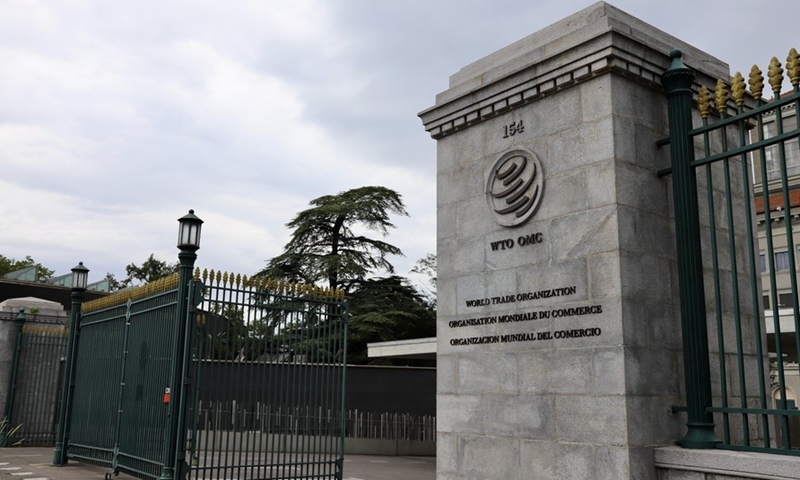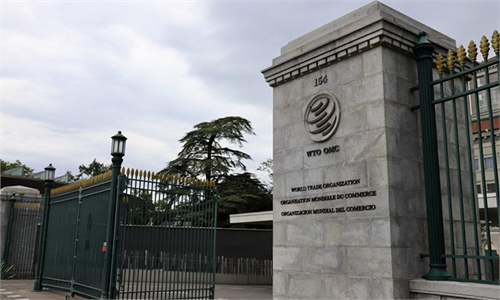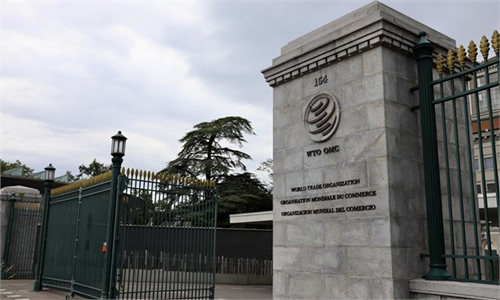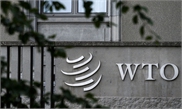
Photo taken on July 15, 2020 shows an exterior view of the World Trade Organization (WTO) headquarters in Geneva, Switzerland. (Photo by Li Ye/Xinhua)
The World Trade Organization (WTO) ruled on Wednesday that the US' mandatory requirement for Hong Kong products to be labeled "Made in China" violated WTO rules. It also rejected the US' defense of invoking the WTO's national security exception.This is the second time within a month that the WTO has rejected the discriminatory policy adopted by the US on related products on the grounds of "national security." Two authoritative cases have emerged, which fundamentally negate the so-called national security exceptionalism of the US and carry enormous significance. China is not the only victim of the US' abuse of the concept of national security in the field of international trade in recent years. Everyone can go to the WTO framework to seek due international fairness and justice.
The status of Hong Kong as a separate customs territory is approved by the Chinese government, confirmed by the Basic Law of Hong Kong and established by the multilateral rules of the WTO. Marking "Made in Hong Kong" on Hong Kong products has been generally accepted by the international community for many years, and it also provides consumers with a clear and correct place of origin. In 2020, the Donald Trump administration unilaterally demanded that Hong Kong products exported to the US modify the origin label on the grounds that the situation in Hong Kong at that time posed a threat to US' national security, in an attempt to discredit "One Country, Two Systems." The Hong Kong SAR government launched the WTO dispute settlement mechanism after repeated but futile communication with the US. The ruling of the WTO expert team once again sounded the alarm in Washington: The national security exception clause is not a "talisman" for unilateralism and hegemony.
Regarding the latest WTO ruling, Washington stopped talking about the "rules-based international order" this time, but once again declared that the WTO expert team "has no right" to review national security issues, and even claimed that the ruling further underscores the need for "fundamental WTO reform." The US has always used the so-called rules-based international order to suppress China. Is the WTO ruling not authoritative enough? Since the US is keen to talk about rules, please first implement the WTO ruling. Only after one has abided by rules can it require others to do so. This is the basic principle of human society. Why on earth should the US be an exception?
From the perspective of WTO rules, the previous definition of "national security exception clause" was indeed relatively vague, giving the US the opportunity and space to abuse it. However, through these two rulings, the boundaries of national security have been defined and this loophole has been blocked. There will be no legitimacy or rationality for the US to do this again in the future.
We all know that US' attitude toward the WTO is quite brutal. In cases where the US is involved, the professionalism, independence and courage of the WTO expert team are even more commendable. The WTO deserves the title of the most important international economic organization in the contemporary world. It is not surprising that the US refused to accept these two judgments. The refusal is in line with the international community's impression of the bossy US. US Trade Representative Katherine Tai even warned a few days ago that because the WTO made a ruling that is not conducive to the "sovereign rights" of the US, the WTO is walking on "very, very thin ice." The threat in her words is naked.
Indeed, the US has become the biggest risk to the normal functioning of the WTO. The WTO Appellate Body has been paralyzed by the US with hooligan means for a long time, and there is no possibility of recovery in the short term. Many people predicted the US would use this opportunity to appeal the two judgments, but because there is currently no appellate body to make a final ruling, the cases will become dead. In other words, the US created a dilemma for the WTO, and then used this dilemma to escape enforcement of the rulings. But if the US really does this, although it can use lame arguments, the damage to its international reputation will be too much, and in the end the US will lose more than it gains.
The WTO and its predecessor, the General Agreement on Tariffs and Trade, were established under the leadership of the US, but now Americans who are increasingly lacking in confidence in the face of China's development have begun to feel that the WTO is taken advantage of by the Chinese. Some very radical views emerged, such as "kicking China out of the WTO," or simply dismantling the WTO. The US government has also become increasingly impatient with the WTO, and often shows extreme resistance to sharing due responsibilities.
Fortunately, the irresponsible US is alone in the WTO. It has neither the power nor the ability to drive China or anyone else out, nor does it have the courage to withdraw from this cornerstone organization of international trade, so it has to play tricks from time to time. When it does these things, although it is relentless, it is guilty, because it knows that these are acts that really violate the rules and disrupt the international order. The US has become a saboteur of the multilateral trading system, a manipulator of double standards in industrial policies, a disruptor of global industrial and supply chains, and a master of unilateral bullying. It must pay for these mistakes.



